
Professor of Biology
Coordinator: Veterinary Studies Program
Coordinator: Program for Undergraduate Research (PURE)
Office: LSF 204G
 |
Tamatha
Barbeau, Ph.D. Professor of Biology Coordinator: Veterinary Studies Program Coordinator: Program for Undergraduate Research (PURE) Office: LSF 204G |
| Contactfmarion.edu |
 |
|
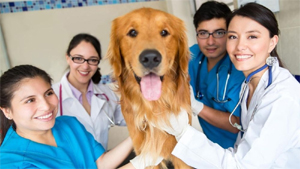 |
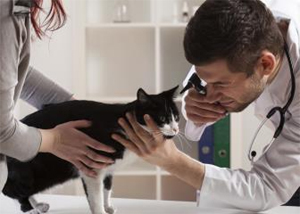 |
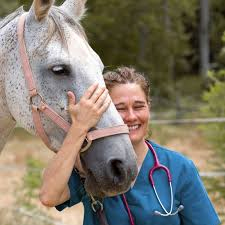 |
|
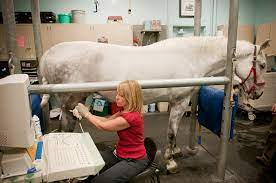 |
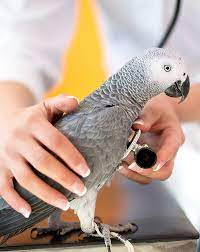 |
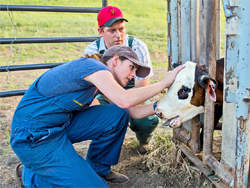 |
|
Preparation for Applying to Veterinary Schools
| All of the pre-requisite
coursework you will need to apply to most veterinary programs in the United
States you can complete in your 4-year Biology program at FMU. If you have
just enrolled at FMU and you are considering pursuing a career in veterinary
medicine, please come and introduce yourself and speak with me. I can help
guide you in your coursework and other activities that will make you a competitive
applicant to a veterinary program. Okay, now before reading any further, be prepared for tough love by your academic advisor: You need to achieve good grades to be a competitive applicant to vet school! There is no sugar-coating this. Vet schools routinely see applicants with GPA's of 3.4 or higher. Your freshman year of college should be focused on learning how to study, and being self-disciplined about consistently making time to study. Stay focused! Remember why you're here, and what you came to accomplish. Don't be a victim of the "freedom explosion" that sometimes accompanies being a college student, away from home. College classes are NOT like high school classes. They can be challenging, and you're going to have to work hard. I recommend starting your college experience with a work ethic of "I am going to study first, and then play later". Sometimes success comes down to simply being disciplined and organized about your coursework. Once you get the hang of being a college student, and you know how to buckle down and work when you need to, then it's okay to make time for extracurricular experiences. They are important for your mental health, social outreach, and making friends. And, vet schools will also be interested in what kinds of extracurricular experiences you had. Being an athlete, a student researcher, a member of academic clubs (like the Pre-Vet club, and also other clubs), taking on leadership roles, and doing community service look excellent on applications! And these things can help you make friends, gain connections, and to grow and find out who you are as a person, in ways that taking classes simply cannot accomplish. |
| Click HERE
for an FMU advising sheet customized for pre-veterinary biology students.
In general, pre-veterinary students register as a Biology major (Bachelor
of science) with a Chemistry minor with a focus on pre-veterinary coursework.
|
| We have a Pre-Vet
Club! Make sure and check it out to find out more. We usually meet
once a month in each semester, but we have many group activities throughout
each month. Come and meet other Pre-Vet students and network! |
Click here for vet
schools 
|

|

As a Pre-Vet advisor, I cannot emphasize how important it is to gain experience shadowing or working at a vet clinic! How else will you know if that is the right career choice for you? There is more to it than simply loving animals. It's a job, and it requires good interpersonal communication skills, leadership skills, some business acumen, and many other qualities. Furthermore, many vet schools specify a minimum number of hours of veterinary experience from their applicants. Vet schools want YOU to be sure that their program is your deepest aspiration, and that you are fully aware of not just the amazing rewards, but also the challenges you will face, from being a veterinarian. It is not a decision to be made lightly, but one that you are resolved to accomplish. |
| Veterinary
Studies Internship (Biol 490). If you would like to receive credit hours at FMU for an internship working with a veterinary clinic of your choosing, click the link above. You can get 1 to 3 credit hours of credit for working with a veterinarian. One credit hour equals 3 hrs of work per week for 13 weeks of the semester, while 2 credit hours equals 6 hrs of work per week for the 13 weeks of the semester. You will not be allowed to take 3 credit hrs of internship within one semester. The internship should be time outside of your studying required by your coursework. You don't want to take on too heavy of an internship word load, such that it conflicts with your academic performance. Your academic performance should be your highest priority. Therefore, I prefer that freshman students don't take on internship hours. You need to know how to effectively budget your time between your studies, and extracurricular work, such as the internship. |
| General
Information on Pre-Vet coursework needed for applying to veterinary school:
General Education Coursework: You will need to take all of the appropriate General Education courses (in Communications, English, Math, Social Sciences, and Humanities) as well as many science courses (Biology, Chemistry, and Physics). Some veterinary programs might want additional coursework in Math (perhaps statistics or even calculus), or additional Biology elective courses (such as Comparative Anatomy or Animal Nutrition). It all depends on what veterinary program you anticipate applying to, because each vet school has slightly different undergraduate coursework requirements. Click the list of accredited vet schools above for a list of schools, links to their websites, application deadlines, entrance exams, special course requirements, and recommended hours of volunteer experience. Biology Coursework: All of these courses required for your Bachelor of Science degree in Biology with Chemistry minor will fulfill prerequisite entrance requirements of most veterinary programs in the United States. You will need to complete introductory Biology courses (Biol 105 or 107, & Biology 106 or 108) and their accompanying laboratories. You will also take a course in Organismal Biology, Ecology, Cell Biology, and Genetics as part of your core Biology coursework. These all fulfill requirements of most veterinary programs. You will also take a minimum of 11 credit hrs of "Elective Biology" courses to complete your Biology coursework. For pre-veterinary students these biology electives are not clearly outlined in your student catalogue because the electives you need to take will depend on the admissions requirements (or recommendations) of the veterinary programs to which you intend to apply. For example, University of Georgia's (UGA) veterinary program strongly recommends applicants to have completed Comparative Anatomy and Microbiology for entrance. An increasing number of veterinary programs want applicants to have completed a Microbiology elective (Biol 311 here). In rare occasions, some veterinary programs might require courses not offered at FMU, such as Animal Science. So, you can see that, with each veterinary program having slightly different requirements, you must do your homework, with your advisor's help, in order to plan to complete all of the prerequisite coursework that your schools of choice want to see on your application. Chemistry coursework: As a pre-veterinary student you will need to take two semesters of Inorganic Chemistry (Chem 111 & 112), Organic Chemistry (Chem 201 & 202) and their accompanying laboratories. Lastly, all vet schools now require Biochemistry (Chem 404), which is only a lecture at FMU. So, by completing Biochemistry you will complete 19 hrs of Chemistry coursework, which equals a minor. Physics Coursework: You will be required to take two semesters of Physics (Phys 215 & 216) and their accompanying laboratories to complete your Biology degree at FMU. Declaring your Minor: Please make sure that by your sophomore year you have declared your minor to the registrar's office. As a Pre-Vet student you most likely will declare a Chemistry minor because you have taken at least 19 hours of chemistry by the time you complete Biochemistry, and a Minor is at least 18 hrs in a selected area. However, not all Pre-Vet students are Biology majors. You might decide to take the approach of actually being a Chemistry major, and have Biology as a minor. This has been done before. Please talk to me if you think this is the approach you wish to take. We will need to work together with a Chemistry advisor to make sure you complete requirements for a Chem major, and take the required Biology coursework for the minor AND required for application to the Vet Schools of your choice. Please see the Administrative Assistant in the Biology office (LSF 204) to have this major and minor put into the system, or fill out the appropriate paperwork to do so. When you become a Senior in Biology: If you have earned up to 87 credit hours of coursework, and will become a senior Biology major, you NEED TO MAKE SURE to have a coursework review by the registrar's office in order to confirm that you are, in fact, have taken or plan to take, the required coursework and total number of credit hours in order to graduate on time. You should have a coursework review completed in the first semester of your senior year! There is nothing more upsetting and discouraging than being in your final semester, thinking you're going to be graduating, and finding out last minute that you're missing credit hours. Be responsible and make sure you have double checked everything! Applying to Vet Schools You and your advisor should begin talking about what vet schools you're interested in before the end of your Sophomore year. That way you can decide what extra coursework you need for the schools you're interested in. Also, check the list of accredited vet schools link above to find out the application deadlines for schools. Most vet schools have a deadline in September ONE ENTIRE YEAR BEFORE you plan (hope) to enter the veterinary program. This means, for example, if you plan to enter a veterinary program next fall, you need to be preparing your application materials and have them completed (entrance essay, transcripts, letters of recommendation, and GRE scores) the prior summer semester - and more likely the summer preceding that fall. This means you need to plan well ahead! What you need to apply to vet schools does depend on the vet school you apply to. So you need to scrutinize the entrance and application requirements for those specific schools to make sure you don't miss any details. Some vet schools require you to take an entrance exam called the Graduate Records Exam (GRE). HOWEVER, many vet schools, since 2020, have removed the GRE from their entrance requirement. You simply need to check your schoools. You will also need (typically) 3 letters of recommendation. Do not wait until 2 weeks before the application deadline to request letters! Most people don't like to have only two weeks warning. Give people a good 2-3 months heads-up about writing a letter for you. A letter from a vet you've worked with is viewed highly, and for some schools one letter from a vet is mandatory. The other letters can be from professors who know you well. You will also need to complete an application form, specific to that program. Most vet schools accept applications, letters of recommendation, transcripts, and GRE scores through a centralized application service called the Veterinary Medical College Application Service (VMCAS). See the List of Vet Schools link above for more about VMCAS. Some vet schools will have a supplemental application form required, in addition to the VMCAS application. Lastly, have you planned for the costs associated with applying to vet schools? It can add up. You have to pay for taking the GRE, having transcripts sent, and for applying to each vet school. Budget ahead of time for this as well. |
Written by Tamatha Barbeau, 2004. This web site is for educational purposes; if you own an image on this site and would like it removed or used with permission, or if you have comments, corrections, or suggestions, please contact me.